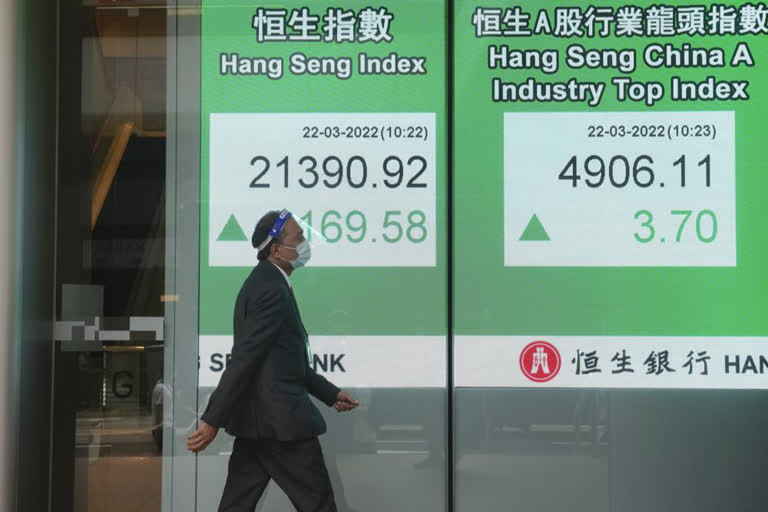Tokyo:Asian shares were mostly higher Tuesday as investors eyed the war in Ukraine, inflationary risks and surging energy prices. Benchmarks rose in morning trading in Japan, South Korea, Australia and Hong Kong, but edged lower in Shanghai. The Russian war on Ukraine and Western sanctions on Russia are adding to worries over energy supplies for Europe, surging prices and progress toward economic recoveries from the pandemic.
With no progress on peace talks, reports are circulating that the EU is setting the table for a Russian oil embargo. Higher energy prices will hugely harm the EU economy, said Stephen Innes, managing partner at SPI Asset Management. Shares ended modestly lower on Wall Street after bouncing around for much of the day and bond yields rose sharply after Federal Reserve Chair Jerome Powell said the central bank was prepared to move more aggressively if need be to contain inflation.
The yield on the 10-year Treasury jumped to 2.30% from 2.14% late Friday. Japan's benchmark Nikkei 225 surged 1.5% to 27,215.65 in morning trading. Australia's S&P/ASX 200 gained 1.1% to 7,357.90. South Korea's Kospi edged 0.5% higher to 2,698.49. Hong Kong's Hang Seng rose 0.5% to 21,319.19, while the Shanghai Composite fell 0.1% to 3,249.54.
On Wall Street, the S&P 500 fell 1.94 points to 4,461.18, snapping a four-day winning streak for the benchmark index. The Dow dropped 0.6% to 34,552.99 and the Nasdaq slid 0.4% to 13,838.46. Smaller company stocks fared worse than the broader market. The Russell 2000 index lost 1% to 2,065.94. In remarks at the National Association of Business Economists, Powell said the Fed would raise its benchmark short-term interest rate by a half-point at multiple Fed meetings, if necessary, to slow inflation. The Fed hasn't raised its benchmark rate by a half-point since May 2000.
On Wednesday, the central bank announced a quarter-point rate hike, its first interest rate increase since 2018. Stocks rallied after the announcement and went on to have their best week in more than a year. The central bank is expected to raise rates several more times this year. Before Russia's invasion of Ukraine added a new wave of global economic uncertainty to the mix, some Fed officials had said the central bank would do better to begin raising rates by a half-point in March.
